Texas Democratic Primary Election 2020 Survey
With all eyes on Super Tuesday on March 3, Texas is a critical state in the determination of the Democratic presidential nominee for 2020. To explore the opinions of likely Democratic primary voters in Texas, the University of Houston Hobby School of Public Affairs conducted an online survey to determine the leading candidates for the Democratic nominees for president and U.S. senator, opinions of salient policies and approval ratings of key national and state politicians. The survey was fielded between February 6 and February 18 with 1,352 YouGov respondents, resulting in a confidence interval of +/-2.7%. The results of this survey is presented in four separate reports. The first report focuses primarily on the vote intention in the Texas Democratic presidential primary election. Primary voters’ preferences and opinions on the U.S. senate candidates comprise the second report. The third report explores a range of policies, especially related to the Green New Deal and health care. The final report provides Texas Democratic primary voters’ evaluations of leading national and state politicians.
Report 1. Vote Intention in the Presidential Primary Election
The Top 3 Democratic Presidential Candidates in Texas
The data suggest a very tight contest between former Vice-President Joe Biden (22.5%) and Senator Bernie Sanders (22.1%), with Senator Elizabeth Warren in third place (18.3%).
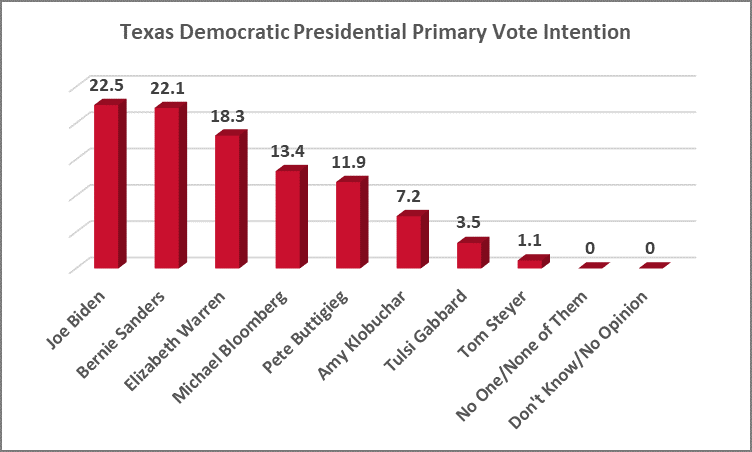
What Trait Matters Most in a Nominee
More than anything else, a solid majority (57.1%) of likely Democratic primary voters want a nominee who can beat President Trump in November.
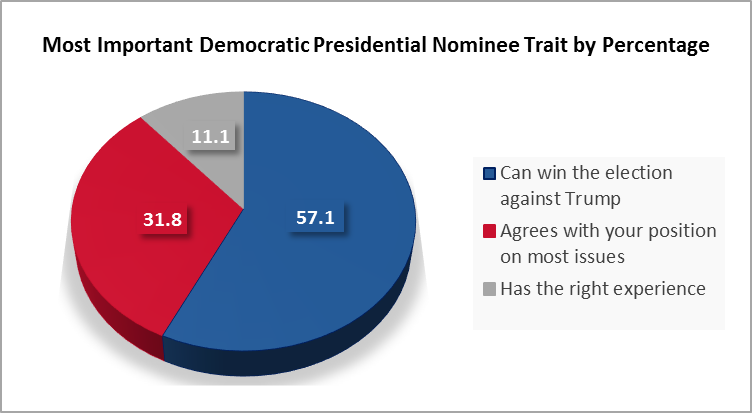
Differences in Support by Gender
Gender differences exist in the support for the candidates with the exception of Sanders. Male voters are more likely than women to favor Biden (25% to 21%) and Buttigieg (15% to 10%), and women are more likely to favor Warren (21% to 14%) and Bloomberg (16% to 10%). Sanders drew equal support from both genders, at just over 22%.
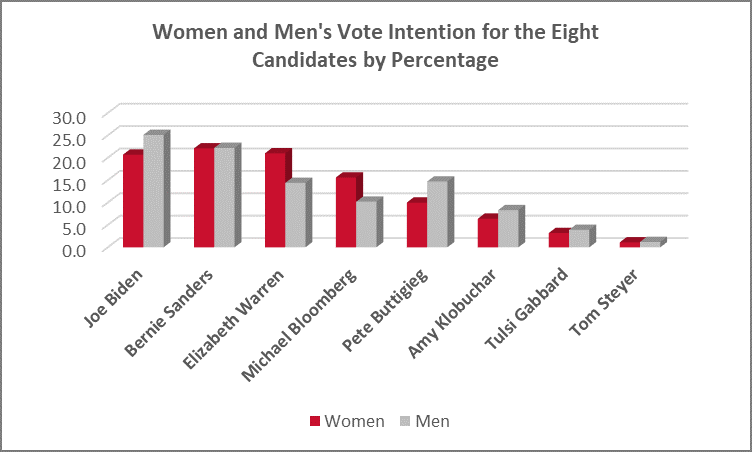
Additional clear divisions among likely Democratic voters based on race, ethnicity and age are also found, suggesting turnout may be the key to determining who garners the most delegates in Texas.
This report also discusses how the Texas’s 228 delegates are assigned in 33 separate allocation processes, along with projections of the 149 district-level delegates using senate-district level data and a hypothetical look at what could happen if Michael Bloomberg obtained a 4% increase in vote intention statewide and in each of the 31 senate districts. Read the full presidential report.
Media Release February 24, 2020
Report 2. Vote Intention in the U.S. Senate Primary Election
Many Still Undecided, Hegar in the Lead
Almost half (46.2%) of the likely Democratic primary voters either don’t know who they are going to vote for (37.4%) or did not plan to vote for any of the 12 candidates (8.8%).
Among those voters who have a preference for a candidate, MJ Hegar dominates the field with 41.0% of the support of those who expressed a vote intention.
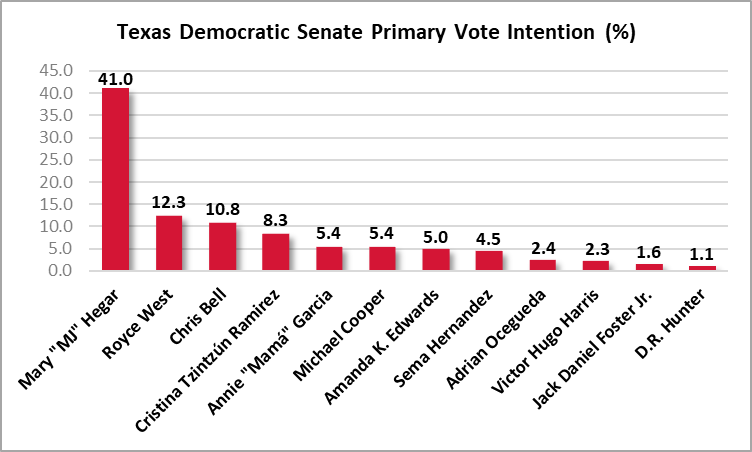
Gender Differences
Among the leading candidates, Royce West and Chris Bell possess similar levels of support among women and men, 11.3% vs. 13.0% and 10.7% vs. 10.8% respectively. In contrast, MJ Hegar enjoys notably more support among women (44.4%) than among men (36.4%), with the opposite true for Cristina Tzintzún Ramirez, who possesses more support among men (11.3%) than among women (6.0%).
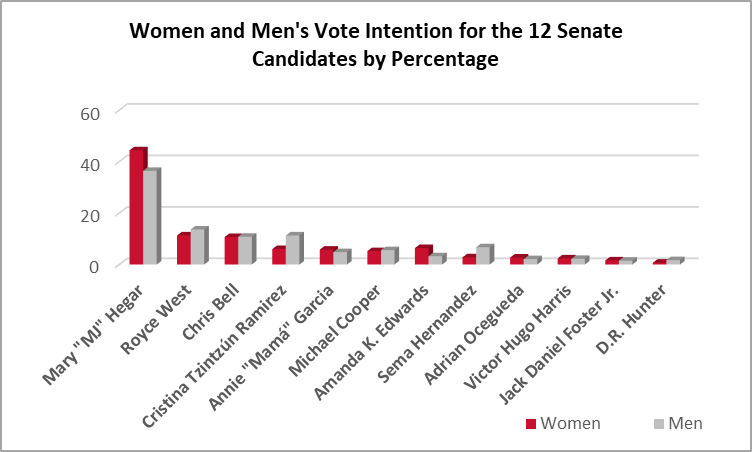
Additional differences among likely Democratic voters based on race, ethnicity, age and region are also found. Read the full senate report.
Media Release February 25, 2020
Report 3. Opinions on Public Policy Issues
Health Care as Most Important Factor in Vote Decision
Health Care is decisively the most important policy issue when making a vote decision in the Democratic primary election. More than two-thirds (36.0%) of the likely Democratic primary voters selected Health Care as the top issue while the second and third issues, Economic Inequality (15.5%) and Climate Change (14.6%), were the only other two issues to reach into the double-digits.
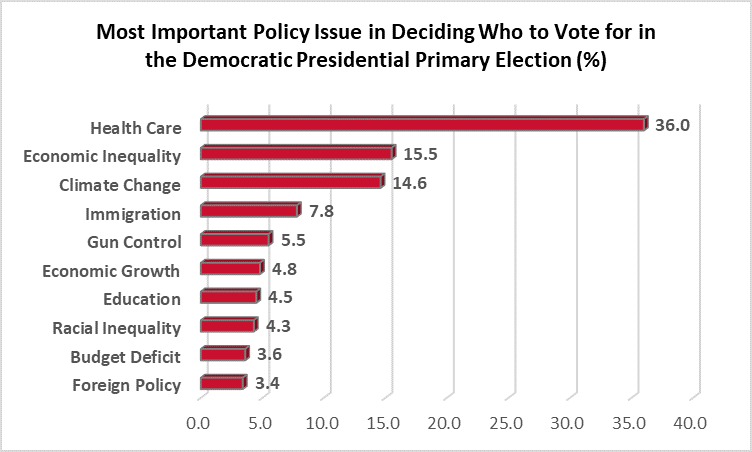
The Effects of Spending and Debt on Support for the Green New Deal
A majority of Texas Democratic primary voters indicate they would oppose the Green New Deal if it would increase federal government spending by trillions of dollars (54.5%) or increase the federal government debt burden by trillions of dollars (60.8%).
More information about the intersection of candidates and public policies, and differences and similarities among likely Democratic voters based on race, ethnicity, age and region are also found. Read the full policy report.
Media Release February 27, 2020
Report 4. Evaluation of Democratic Political Elites
Most Popular in Texas
This report contains Texas Democratic primary voters’ evaluations of three sets of political elites: National and Texas elites not currently running for the Democratic nomination for president or U.S. Senate, the Democratic presidential candidates, and the four leading candidates competing in the Texas Democratic senate primary.
The most popular Democrat among likely Texas Democratic primary voters by far is Barack Obama, who is viewed favorably by 87.3% (with 70.1% very favorably and 17.2% favorably). After Obama, the two most popular Democrats are Beto O’Rourke and Nancy Pelosi and for respective overall favorable ratings of 78.9% and 74.6%.
Favorability ratings for highly visible national politicians such as Hilary Clinton and Alexandria Ocasio-Cortez are included as well as Houston’s Sylvester Turner. Read the full evaluation report.
Research Team
Renée Cross, Senior Director & Researcher, Hobby School of Public Affairs
Jim Granato, Executive Director, Hobby School of Public Affairs
Mark P. Jones, James A. Baker III Institute for Public Policy's Fellow in Political Science, Rice University; Senior Research Fellow, Hobby School of Public Affairs
Agustín Vallejo, Post-Doctoral Fellow, Hobby School of Public Affairs